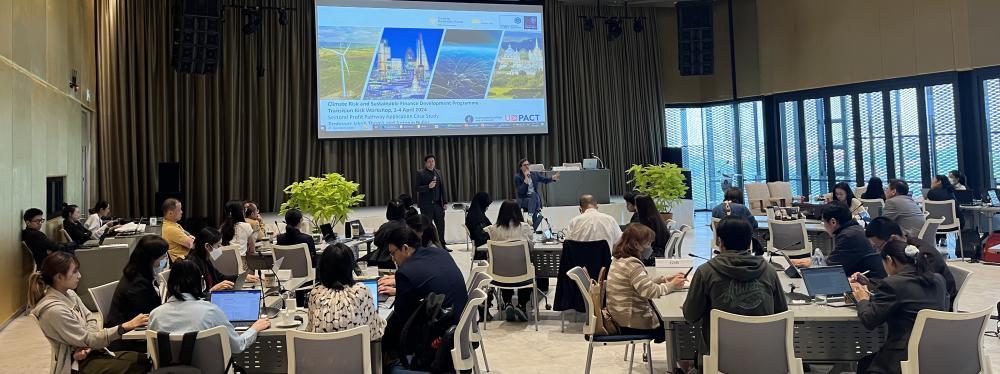SOAS Centre for Sustainable Finance trains Thai banks on climate risks


On 3-4 April 2024, the Centre for Sustainable Finance at SOAS University of London and Theia Finance Labs convened a Transition Risk Workshop at the Bank of Thailand.
The programme was delivered as part of the Climate Risk and Sustainable Finance Development Programme, a partnership between SOAS, Theia Finance Labs and the University of Oxford, funded by UK PACT (Partnering for Accelerated Climate Transitions).
The workshop was co-led by Professor Jakob Thomä, Professor in Practice at the SOAS Centre for Sustainable Finance and Co-founder and Research Director of Theia Finance Labs, and Professor Ulrich Volz, the Director of the SOAS Centre for Sustainable Finance, with contributions by Antonio Buller from Theia Finance Labs.
Over 100 staff of the Bank of Thailand and from Thai banks participated in the workshop, which was held at the Bank of Thailand Learning Center. The workshop was opened by speeches by Suwannee Jatsadasak, Assistant Governor Supervision Group of the Bank of Thailand, and Anna Pearson, Economic and Sustainable Development Counsellor at the British Embassy in Bangkok, highlighting the importance for the Thai financial sector of addressing transition risks and the urgent need for scaling up transition finance in line with Thailand’s net-zero target for 2065.
In nine sessions, the workshop covered topics such as transition risk and sectoral profit pathways, transition risk data, just transition finance, and transition plans. Participants were also introduced to the 1in1000 TRISK model, a tool banks can use to measure transition risk. The TRISK model was fitted to the Thai context as part of the Climate Risk and Sustainable Finance Development Programme.
Professor Jakob Thomä says: One of the exciting features of this project is to build an end-to-end climate risk analytics solution, demonstrating that the question of measuring and managing climate-related risks is not a question of whether it is doable, but whether it is done.
Professor Ulrich Volz says: It’s a great pleasure to continue our collaboration with the Bank of Thailand and fantastic to see how much interest there is among Thai financial institutions in better understanding and assessing transition risks. I was particularly pleased to see such strong interest in the topic of just transition finance.
Anna Pearson says: The UK, as a leader in sustainable finance, is committed to supporting international partners to achieve net zero while promoting sustainable economic growth. We are honoured to work with the Bank of Thailand and Thai financial institutions, and experts from SOAS University of London, Theia Finance Labs and Oxford University to understand and mitigate climate risks, and to scale up sustainable finance. By working together, we can find innovative solutions that benefit both economies and the environment.
The workshop followed on a capacity building on climate risk and sustainable finance that SOAS and its partners delivered to 80 Bank of Thailand staff in December 2023.
The SOAS Centre for Sustainable Finance has been working with many central banks around the world on addressing climate and nature risks and has been conducting numerous capacity building programmes in this area for central banks and financial supervisors. Over the last two years, the SOAS Centre for Sustainable Finance has co-convened the ‘ASEAN Core Curriculum on Climate Risk Resilience/Sustainable Finance’ which SOAS developed together with the South East Asian Central Banks (SEACEN) Research and Training Centre on request of the ASEAN central bank governors. In Southeast Asia, the SOAS Centre for Sustainable Finance has recently also delivered capacity building programmes for the Monetary Authority of Singapore and Bank Negara Malaysia, the Malaysian central bank. The SOAS Centre for Sustainable Finance recently also supported the Bangko Sentral ng Pilipinas, the central bank of the Philippines, in developing its Sustainable Central Banking Strategy.
UK PACT is a capacity-building programme, jointly governed by the UK Government’s Foreign, Commonwealth and Development Office (FCDO) and the Department for Energy Security and Net Zero (DESNZ). It works in partnership with countries with high emissions reduction potential to support them to implement and increase their ambitions for tackling climate change.
Header image credit: Braden Jarvis via Unsplash.



